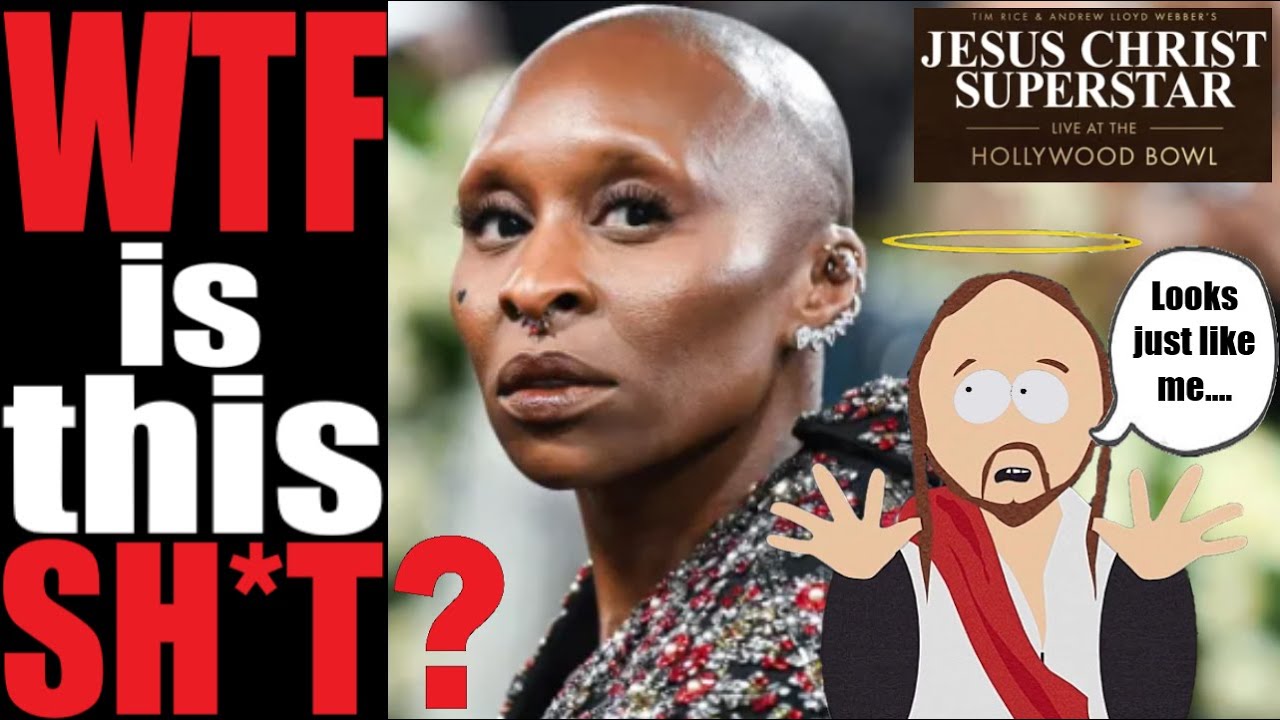Cynthia Erivo’s Jesus Christ Role is BREAKING the Internet!
Clips of Cynthia Erivo as Jesus in Jesus Christ Superstar are going VIRAL, but not for the reasons you think! 😳 The internet is RUTHLESSLY mocking her performance—find out why this casting is causing such a stir!

Cynthia Erivo’s Casting as Jesus in Jesus Christ Superstar: A Controversy That Shook the Stage
Introduction: A Casting Choice That Ignited Debate
In August 2025, the Hollywood Bowl’s three-night production of Andrew Lloyd Webber and Tim Rice’s Jesus Christ Superstar made headlines, not just for its star-studded cast but for the polarizing decision to cast Cynthia Erivo, a Black, queer woman, as Jesus Christ. The production, which ran from August 1-3, drew both critical acclaim and intense backlash, with clips of Erivo’s performance circulating widely online and facing ruthless mockery from some quarters. Critics called the casting “blasphemous” and “demonic,” while supporters hailed it as a bold, transformative take on a historically provocative musical. This article delves into the controversy, the reactions it provoked, and its broader implications for art, faith, and representation in a divided cultural landscape.
The Production: A Star-Studded Revival
Jesus Christ Superstar, first released as a concept album in 1970 before its 1971 Broadway debut, is a rock opera that reimagines the final days of Jesus Christ through the lens of his betrayer, Judas Iscariot. Known for its provocative take on Christianity, the musical has always courted controversy, drawing protests for its humanized portrayal of Jesus and sympathetic depiction of Judas. The 2025 Hollywood Bowl production, directed by Tony Award winner Sergio Trujillo and conducted by Stephen Oremus, leaned into the show’s rock roots, featuring a stellar cast: Erivo as Jesus, Adam Lambert as Judas, Phillipa Soo as Mary Magdalene, and Raúl Esparza as Pontius Pilate, with John Stamos stepping in as King Herod after Josh Gad’s COVID-related withdrawal.
Erivo, a Tony and Grammy winner known for her roles in The Color Purple and Wicked, brought vocal prowess and emotional depth to the role, particularly in the demanding number “Gethsemane (I Only Want to Say),” where she showcased Jesus’ vulnerability and anguish. Critics praised her “heaven-sent” performance, with Variety noting that her casting transcended gender, making the role feel “written for a powerful woman’s voice.” Yet, the decision to cast a Black, openly bisexual woman as Jesus sparked a firestorm, with viral clips of her performance—particularly one showing her wearing a crown of thorns while tied to a crossbeam—drawing harsh criticism and mockery online.
The Backlash: From Outrage to Mockery
The announcement of Erivo’s casting in February 2025 set the stage for controversy. Conservative commentators and Christian groups decried the choice as disrespectful to the historical and theological figure of Jesus, a Middle Eastern man. Christian actor Kevin Sorbo, known for Hercules and God’s Not Dead, posted a clip of Erivo and Lambert performing, captioning it, “This is demonic,” a post that garnered over 4 million views. Cameron Bertuzzi of Capturing Christianity echoed this sentiment, arguing that Christians expect a male actor to portray their Messiah for historical accuracy. On X, users like @KarluskaP and @its_The_Dr called the production a “desecration” and compared Erivo’s appearance—bald head, long nails, and white fringed gown—to “Bride of Frankenstein” or “Gollum,” mocking her physicality in ways that critics argued were racially charged.
The mockery extended beyond religious objections. Some online commentators, including self-professed fans of Jesus Christ Superstar, criticized Erivo’s performance itself, claiming it lacked the “musical power” needed for the role. One X user, @grant_huser, wrote, “Cynthia Erivo is a terrible Jesus Christ… Adam Lambert as Judas can sing a thousand times better.” Others expressed disappointment that the casting felt like “stunt casting” for clout, arguing it overshadowed the musical’s legacy. These critiques often blended with broader cultural grievances, with some accusing the production of pushing a “woke” agenda by prioritizing diversity over authenticity.
The Defense: Art as Provocation
Supporters of Erivo’s casting, including her co-star Adam Lambert, argued that Jesus Christ Superstar has always been a provocative work meant to challenge norms. Lambert, who played Judas, told Billboard, “Cynthia’s brilliant… I’m excited by the challenge of presenting a female, Black ‘Jesus’ and encouraging the audience to expand their minds. This show is supposed to provoke.” Erivo herself addressed the backlash with defiance, telling Billboard, “Why not? You can’t please everyone. It’s a musical, the gayest place on Earth.” She emphasized the production’s three-day run as an opportunity to “sing my face off,” dismissing critics who took offense at her identity.
The musical’s history supports this perspective. Since its debut, Jesus Christ Superstar has faced protests for its secular take on Jesus’ story, de-emphasizing his divinity and portraying Judas sympathetically. Previous productions have also pushed boundaries, with women like Morgan James playing Jesus in an all-female 2022 concept album where Erivo herself portrayed Mary Magdalene. Defenders argued that casting a Black, queer woman as Jesus aligns with the show’s tradition of subversion and reflects the malleability of Jesus’ image across cultures, from Black and Asian depictions to modern reinterpretations.
Critics like those on Reddit’s r/musicals subreddit noted that the outrage often came from those already opposed to the musical’s premise, with one user stating, “The kind of people offended by a Black woman playing Jesus are the same ones who hated Jesus Christ Superstar in 1971.” Others praised Erivo’s vocal and emotional range, with The Los Angeles Times describing her performance as “magnetic” and “heaven-sent,” arguing that it reframed Jesus as a figure of universal humanity.
The Cultural Context: Faith, Art, and Identity
The controversy over Erivo’s casting reflects deeper tensions over faith, art, and representation. For many Christians, particularly evangelicals, Jesus Christ Superstar itself is problematic for its non-traditional portrayal of Jesus, and casting a Black, queer woman amplified these concerns. Kristan Hawkins of Students for Life of America called Erivo’s performance “intentional blasphemy,” reflecting a belief that the casting was a deliberate provocation. On Reddit’s r/Catholicism, users debated whether the production disrespected their faith, with some dismissing it as “professional edgy cringe” meant to shock.
Conversely, supporters argued that art should challenge conventions, especially in a musical designed to provoke. The Guardian noted that while Erivo’s Jesus was “restrained” in the first half, her “Gethsemane” performance won over audiences, earning a mid-act standing ovation. Forbes called for the production to tour, praising Erivo and Lambert for turning the 1970s rock opera into a “revelation worthy of a wider audience.” The casting also resonated with marginalized communities, with some seeing Erivo’s Jesus as a powerful statement of inclusivity, aligning with Christianity’s global adaptability across diverse cultural lenses.
Social Media’s Role: Amplifying Mockery and Debate
Social media played a pivotal role in escalating the controversy. Clips of Erivo’s performance, particularly one showing her in a crown of thorns, went viral on X and YouTube, amassing millions of views. Comments sections were flooded with mockery, from comparisons to “Gollum” to accusations of “blasphemy.” Hashtags like #CynthiaErivo and #JesusChristSuperstar trended, with posts ranging from praise for her vocal prowess to cruel jabs at her appearance. This dynamic mirrors broader trends where social media amplifies outrage, often distorting intent and fueling personal attacks.
The mockery of Erivo’s appearance—focusing on her bald head, long nails, and costume—drew accusations of racism and misogyny. Supporters argued that such critiques disproportionately targeted her identity as a Black woman, echoing the backlash faced by other Black actresses in high-profile roles. The intensity of the online reaction highlights the challenges performers face when taking on culturally significant roles in a polarized digital age.
Implications for Theater and Representation
Erivo’s casting raises questions about the role of theater in challenging societal norms. Jesus Christ Superstar has always pushed boundaries, from its rock score to its reimagining of biblical figures. Erivo’s performance continues this tradition, proving that powerful storytelling can transcend traditional casting norms. Her vocal and emotional delivery, particularly in “Gethsemane,” demonstrated that the essence of Jesus’ character—humanity, sacrifice, and vulnerability—can be conveyed regardless of gender or race.
However, the backlash underscores the limits of such experimentation in a divided cultural climate. While some embraced the casting as a step toward inclusivity, others saw it as an affront to their faith or the musical’s legacy. The controversy also highlights the double standards faced by Black performers, who often face harsher scrutiny than their white counterparts in similar roles. For example, John Legend’s casting as Jesus in 2018 drew less outrage, suggesting that gender and race played a significant role in the reaction to Erivo.
Conclusion: A Stage for Society’s Divisions
Cynthia Erivo’s casting as Jesus in Jesus Christ Superstar was a bold artistic choice that both honored the musical’s provocative legacy and exposed deep cultural fault lines. The ruthless mockery of her performance, fueled by social media, reflects broader tensions over faith, identity, and representation. While critics decried the casting as “blasphemous,” supporters celebrated it as a powerful reimagining of a timeless story. Erivo’s resilience in the face of backlash, coupled with her undeniable talent, underscores the potential for art to challenge norms and spark dialogue. As theater continues to push boundaries, this controversy serves as a reminder that the stage is not just a place for storytelling but a mirror to society’s deepest divisions.





